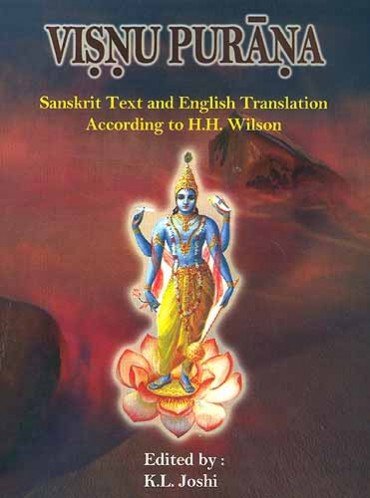The Vishnu Purana
by Horace Hayman Wilson | 1840 | 287,946 words | ISBN-10: 8171102127
The English translation of the Vishnu Purana. This is a primary sacred text of the Vaishnava branch of Hinduism. It is one of the eighteen greater Puranas, a branch of sacred Vedic literature which was first committed to writing during the first millennium of the common era. Like most of the other Puranas, this is a complete narrative from the cr...
Chapter XI - Anger of Indra and holding Govardhana mountain by Krishna
Indra, offended by the loss of his offerings, causes heavy rain to deluge Gokula. Kṛṣṇa holds up the mountain Govarddhana to shelter the cowherds and their cattle.
INDRA, being thus disappointed of his offerings, was exceedingly angry, and thus addressed a cohort of his attendant clouds, called Samvarttaka: “Ho, clouds,” he said, “hear my words, and without delay execute what I command. The insensate cowherd Nanda, assisted by his fellows, has withheld the usual offerings to us, relying upon the protection of Kṛṣṇa. Now, therefore, afflict the cattle, that are their sustenance, and whence their occupation is derived, with rain and wind. Mounted upon my elephant, as vast as a mountain peak, I will give you aid in strengthening the tempest.” When Indra ceased, the clouds, obedient to his commands, came down, in a fearful storm of rain and wind, to destroy the cattle. In an instant the earth, the points of the horizon, and the sky, were all blended into one by the heavy and incessant shower. The clouds roared aloud, as if in terror of the lightning's scourge, and poured down uninterrupted torrents. The whole earth was enveloped in impenetrable darkness by the thick and volumed clouds; and above, below, and on every side, the world was water. The cattle, pelted by the storm, shrunk cowering into the smallest size, or gave up their breath: some covered their calves with their flanks, and some beheld their young ones carried away by the flood. The calves, trembling in the wind, looked piteously at their mothers, or implored in low moans, as it were, the succour of Kṛṣṇa. Hari, beholding all Gokula agitated with alarm, cowherds, cowherdesses, and cattle all in a state of consternation, thus reflected: “This is the work of Mahendra, in resentment of the prevention of his sacrifice, and it is iñcumbent on me to defend this station of herdsmen. I will lift up this spacious mountain from its stony base, and hold it up, as a large umbrella, over the cow-pens.” Having thus determined, Kṛṣṇa immediately plucked up the mountain Govarddhana, and held it aloft with one hand in sport, saying to the herdsmen, “Lo the mountain is on high; enter beneath it quickly, and it will shelter you from the storm: here you will be secure and at your ease in places defended from the wind: enter without delay, and fear not that the mountain will fall.” Upon this, all the people, with their herds, and their waggons and goods, and the Gopīs, distressed by the rain, repaired to the shelter of the mountain, which Kṛṣṇa held steadily over their heads; and Kṛṣṇa, as he supported the mountain, was contemplated by the dwellers of Vraja with joy and wonder; and, as their eyes opened wide with astonishment and pleasure, the Gopas and Gopīs sang his praise. For seven days and nights did the vast clouds sent by Indra rain upon the Gokula of Nanda to destroy its inhabitants, but they were protected by the elevation of the mountain; and the slayer of Bala, Indra, being foiled in his purpose, commanded the clouds to cease. The threats of Indra having been fruitless, and the heavens clear, all Gokula came forth from its shelter, and returned to its own abode. Then Kṛṣṇa, in the sight of the surprised inhabitants of the forests, restored the great mountain Govarddhana to its original site[1].
Footnotes and references:
[1]:
It seems not unlikely that this legend has some reference to the caves or cavern temples in various parts of India. A remarkable representation of it occurs upon the sculptured rocks of Mahabalipur. It is related much to the same purport in the Bhāgavata, &c. Śiśupāla, ridiculing the exploit, asserts that Govarddhana was nothing more than an ant hill.
